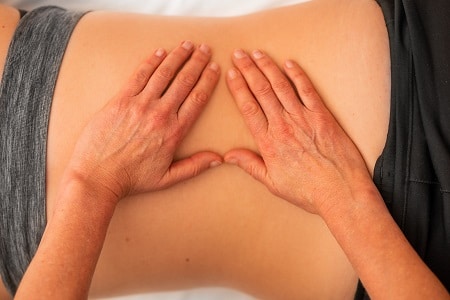Why do we need to pay attention to our muscles?
Tight muscles can impact how our body functions and if left untreated can alter our posture and gait i.e. the way we walk and move and impact the outcome of other treatments, such as holding the changes made from a chiropractic adjustment. Your body needs to use its muscles correctly and increasing strength may be a part of improving your body’s ability to function better. This is why stretches and specially targeted exercises may be beneficial. It’s not just to move more freely, while improved flexibility is important, so is strength and conditioning. If you don’t look at the body as a whole and what is needed to be moving better on an ongoing basis, then some beneficial changes may only be fleeting.
Sometimes we also don’t realise what a tight muscle might be impacting. Have you ever had a massage of your back and shoulders, then felt the difference immediately afterwards when you’ve taken a breath? You can breathe more deeply as your ribs open up, but may not have realised you hadn’t been able to until that moment!
We can’t always release tight muscles on our own and so it can then make it hard to do the exercises and stretches we need to. That’s when massage is so beneficial. Afterwards, we can move better and it is so much easier to maintain good posture. Then, when we feel our muscles tightening up again, the stretches work better to release that tension, and we are actually less likely to cause ourselves an injury.
So why can massaging sometimes hurt?
Feeling at times uncomfortable is normal and can often mean your muscles are very tight.
Pain experienced during a massage should be a ‘good’ pain, rather than a pain where you have to hold your breath. However, everyone has different pain thresholds and different perceptions of physical pain. So let your massage therapist know how you are feeling if the treatment is causing you discomfort.
Sore muscles, damaged ligaments and tendons, and inflamed tissue can be painful when your massage therapist begins to work on them. Areas around it can respond in maybe unexpected ways. The type of massage technique being used may also impact how your body feels and responds.
Fascia is the connective tissue in our bodies that work to hold muscles, organs, and other bodily structures in place. They can appear as bands or sheets and it is in the fascia that trigger points can appear.
What is a trigger point?
A trigger point is a small, painful ‘knot’ in the fascia. Trigger points will often shoot pain out to other parts of the body. They are often hypersensitive to touch when being released and this can be felt through massage or dry needling.
We have also seen your surprise after a massage when treatment was done on points on the body that you didn’t realise were contributing to your presenting symptoms. You might come in with a pain in your shoulder, but the source for it was actually originating in your hip. (Who’d thought!?)
So, what is referred pain?
Referred pain is when the pain you feel in one part of your body is actually caused by pain or injury in another part of your body. This can happen because signals from several areas of the body often travel through the same nerve pathways in the spinal cord and brain.
Remember that so much of our body’s inner systems are interrelated and connective tissue is also what holds our organs, blood vessels, bones, nerve fibres and muscles in place. So what impacts one part of your body can certainly affect another.
Is it always going to be painful?
No, it won’t be. Certain conditions will cause pain. During massage, especially if a specific issue is being treated, our massage therapists will work with you to ensure this is manageable and it will often diminish or disappear as treatment continues. By communicating how you are feeling to us, you will get the full benefits from your treatment.
From our perspective, when we can see a change in someone after their pain is reduced following treatments, what more could we wish for.
“Health is a state of complete physical, mental and social well being, and not merely the absence of disease or infirmity”
WHO
You can book a massage with us online 24/7 and let our massage therapists help relieve your muscle pain.
Cheers,
Anthony

